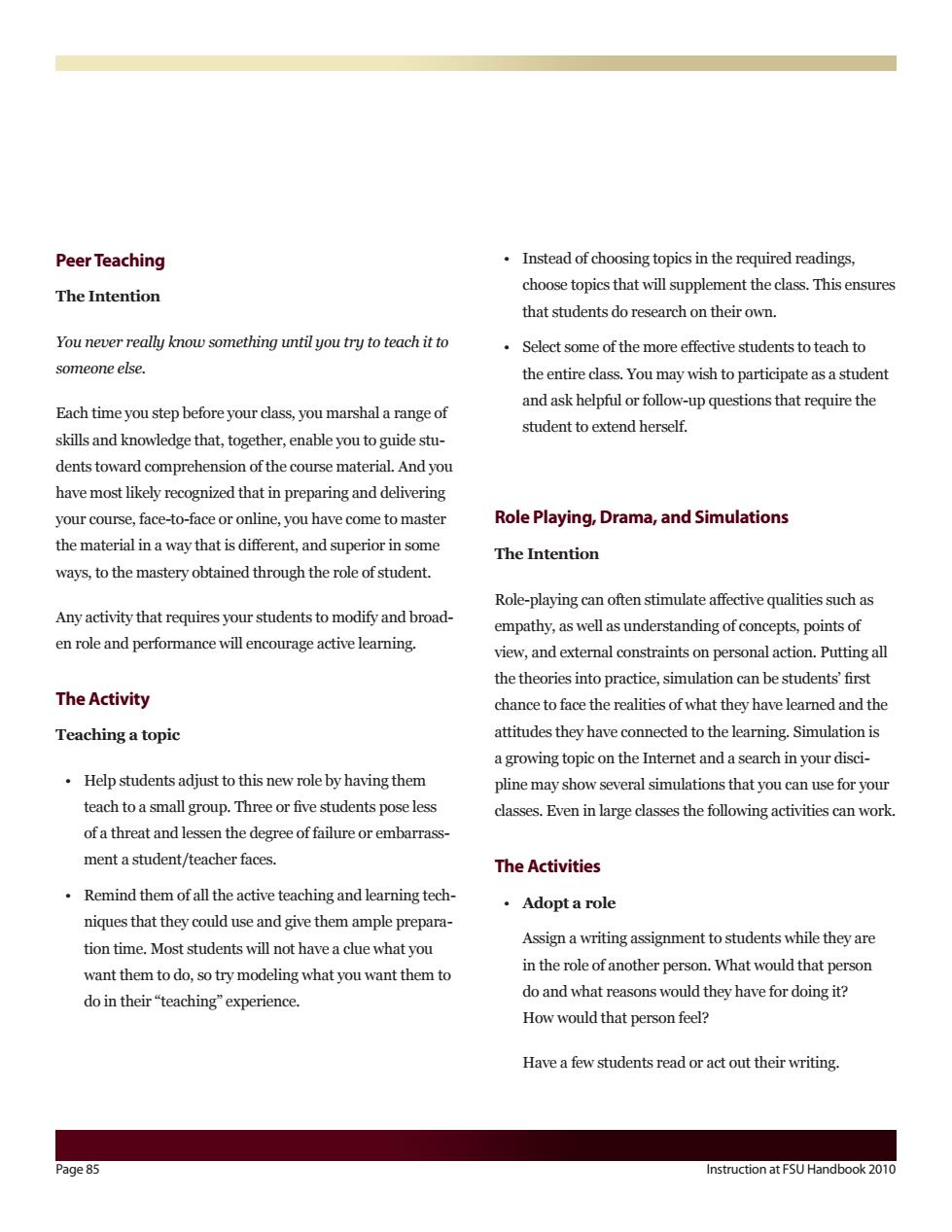正在加载图片...

Peer Teaching Instead of choosing topics in the required readings, The Intention choose topics that will supplement the class.This ensures that students do research on theirown. You never really know something until you try to teach it to Select some of the more effective students to teach to someone else. the entire class.You may wish to participate as a student and ask helpful or follow-up questions that require the Each time you step before your class,you marshal a range of student to extend herself. skills and knowledge that,together,enable you to guide stu- dents toward comprehension of the course material And you have most likely recognized that in preparing and delivering your course,face-to-face or online,you have come to master Role Playing,Drama,and Simulations the material in a way that is different,and superior in some The Intention ways,to the mastery obtained through the role of student. Role-plaving can often stimulate affective qualities such as Any activity that requires your students to modify and broad- empathy,as well as understanding of concepts,points of en role and performance will encourage active learning. view,and external constraints on personal action.Putting all the theories into practice,simulation can be students'first The Activity chance to face the realities of what they have learned and the Teaching a topic attitudes they have connected to the learning.Simulation is a growing topic on the Internet and a search in your disci- Help students adjust to this new role by having them pline may show several simulations that you can use for your teach to a small group.Three or five students pose less classes.Even in large classes the following activities can work of a threat and lessen the degree of failure or embarras ment a student/teacher faces The Activities Remind them of all the active teaching and learning tech ·Adopt a role niques that they could use and give them ample prepara- tion time.Most students will not have a clue what you Assign a writing assignment to students while they are in the role of another person.What would that person want them to do,so try modeling what you want them to do in their"teaching"experience. do and what reasons would they have for doing it? How would that person feel? Have a few students read or act out their writing. Instruction at FSUHandb Page 85 Instruction at FSU Handbook 2010 Peer Teaching The Intention You never really know something until you try to teach it to someone else. Each time you step before your class, you marshal a range of skills and knowledge that, together, enable you to guide students toward comprehension of the course material. And you have most likely recognized that in preparing and delivering your course, face-to-face or online, you have come to master the material in a way that is different, and superior in some ways, to the mastery obtained through the role of student. Any activity that requires your students to modify and broaden role and performance will encourage active learning. The Activity Teaching a topic • Help students adjust to this new role by having them teach to a small group. Three or five students pose less of a threat and lessen the degree of failure or embarrassment a student/teacher faces. • Remind them of all the active teaching and learning techniques that they could use and give them ample preparation time. Most students will not have a clue what you want them to do, so try modeling what you want them to do in their “teaching” experience. • Instead of choosing topics in the required readings, choose topics that will supplement the class. This ensures that students do research on their own. • Select some of the more effective students to teach to the entire class. You may wish to participate as a student and ask helpful or follow-up questions that require the student to extend herself. Role Playing, Drama, and Simulations The Intention Role-playing can often stimulate affective qualities such as empathy, as well as understanding of concepts, points of view, and external constraints on personal action. Putting all the theories into practice, simulation can be students’ first chance to face the realities of what they have learned and the attitudes they have connected to the learning. Simulation is a growing topic on the Internet and a search in your discipline may show several simulations that you can use for your classes. Even in large classes the following activities can work. The Activities • Adopt a role Assign a writing assignment to students while they are in the role of another person. What would that person do and what reasons would they have for doing it? How would that person feel? Have a few students read or act out their writing